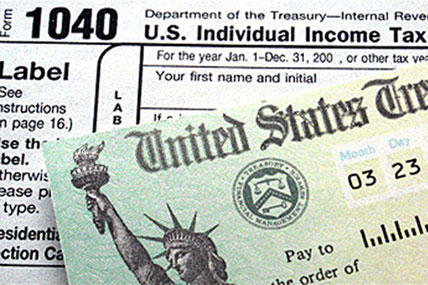"Financial planners hit monster lotto payout ... and quit work."
When we hear "windfall," that's the kind of image that pops into our heads.
But this month, we're thinking of a windfall that's a lot smaller and a lot more common: the tax refund. Over the past few years, the average refund has hovered near $3,000.
While letting the government hang onto your money, interest free, over the course of the year may not be a great thing, it certainly offers an opportunity. We've got some ideas to help you make the best use of it before it's nothing but a memory ... or a big-screen TV.
Pay down debt. If you've got any high-interest consumer debt, why not get rid of some or all of it with your refund money? It'll save you a lot of wasted interest and could relieve a lot of stress. But you may not want to use the entire refund to trim your debt, because our second idea is central to avoiding debt in the future.
Build an emergency fund. If you don't have the old cash stash of 3-6 months' worth of committed expenses set aside as an emergency fund, now is the time to start building. Otherwise, the next time you get hit with a financial surprise, you may have to turn to a credit card or something worse.
Save for retirement. Will your tax refund be the engine that single-handedly funds your golden years? Nope. However, it could be the spark that gets you consistently putting money away in an IRA, Roth IRA or employer plan. Use your refund to get -- and keep -- the ball rolling.
Purposeful saving. You already know they're coming: new tires, kids' activity fees, holiday gifts or maybe even a vacation. Get a head start by placing a portion of your refund into a savings account to help foot the bill.
Whatever the source of your next windfall, even if it isn't big enough to buy your own island, it can definitely provide a chance to tighten up your personal finances.




